
GLOBAL JOURNAL OF ENVIRONMENTAL SCIENCE AND MANAGEMENT-GJESM
Scope & Guideline
Leading the way in environmental discourse and innovation.
Introduction
Aims and Scopes
- Sustainable Resource Management:
The journal focuses on sustainable management practices for natural resources, including water, soil, and biodiversity. Research explores innovative methods to optimize resource use while minimizing environmental impacts. - Pollution and Waste Management:
A significant area of study involves the assessment and management of pollution from various sources, including industrial, agricultural, and urban settings. This includes research on waste management strategies and technologies for pollution reduction. - Climate Change and Adaptation Strategies:
Research articles frequently address the impacts of climate change and propose adaptation strategies for vulnerable ecosystems and communities, highlighting both mitigation and resilience-building approaches. - Ecotoxicology and Environmental Health:
The journal covers studies on the effects of pollutants on ecosystems and human health, including the assessment of toxic substances and their ecological implications. - Biodiversity Conservation and Ecosystem Services:
GJESM emphasizes the importance of conserving biodiversity and understanding ecosystem services. Research often focuses on the role of ecosystems in supporting human well-being and the need for conservation efforts. - Technological Innovations in Environmental Management:
The journal welcomes research on technological advancements that support environmental sustainability, including the use of biotechnologies, remote sensing, and data modeling for environmental monitoring and management.
Trending and Emerging
- Microplastic Research:
Recent publications show a surge in studies addressing microplastic contamination across various ecosystems, highlighting its ecological impacts and potential human health risks, reflecting a growing global concern. - Climate Resilience and Adaptation:
There is a notable increase in research dedicated to climate resilience strategies, emphasizing adaptive management practices that help communities and ecosystems cope with climate change impacts. - Circular Economy Initiatives:
Emerging themes related to the circular economy are becoming prominent, with research focusing on waste reduction, recycling, and sustainable resource utilization, promoting a transition towards more sustainable production and consumption patterns. - Technological Integration in Environmental Management:
A trend towards the integration of advanced technologies, such as artificial intelligence and remote sensing, into environmental monitoring and management practices is becoming increasingly evident, reflecting a push for data-driven decision-making. - Community Engagement and Social Dimensions of Environmental Management:
Recent studies emphasize the importance of community participation and social equity in environmental management, indicating a shift towards inclusive approaches that consider local knowledge and stakeholder involvement.
Declining or Waning
- Traditional Agricultural Practices:
Research focusing on conventional agricultural practices has decreased, likely due to an increasing shift towards sustainable and organic farming methods that prioritize ecological balance and reduced chemical use. - Single-species Focus in Biodiversity Studies:
There is a noticeable decline in studies solely centered on single-species assessments, as the journal increasingly promotes research that considers ecosystem interactions and multi-species dynamics. - Generalized Environmental Policy Analysis:
While policy analysis remains important, there is a waning interest in broad, generalized studies without specific contextual applications, as researchers and practitioners seek more targeted, actionable insights.
Similar Journals
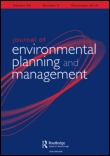
Journal of Environmental Planning and Management
Advancing sustainable solutions for a thriving planet.The Journal of Environmental Planning and Management, published by Routledge Journals, Taylor & Francis Ltd, is a leading academic journal dedicated to advancing the field of environmental science through innovative research and critical analysis. With a robust impact factor and categorized in Q1 across multiple disciplines, including Environmental Science, Geography, and Fluid Flow, this journal holds a prestigious position in the academic community. It serves as a vital platform for researchers, professionals, and students interested in the complexities of environmental management, policy, and planning, promoting insightful discourse on sustainable practices and innovative solutions. Although the journal does not currently offer Open Access options, it remains widely accessible through institutional subscriptions, ensuring that pertinent research reaches a broad audience. Since its inception in 1992, the journal has shown a commitment to excellence, making significant contributions to our understanding of environmental issues and the interplay between human activity and natural systems. The Journal of Environmental Planning and Management invites submissions that not only push the boundaries of existing knowledge but also foster interdisciplinary collaboration in the quest for sustainable development.
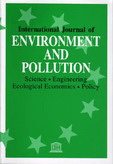
INTERNATIONAL JOURNAL OF ENVIRONMENT AND POLLUTION
Fostering Dialogue on Waste Management and Ecological ImpactInternational Journal of Environment and Pollution is a pivotal publication in the field of environmental science, dedicated to advancing knowledge concerning pollution and its multifaceted impacts on ecosystems and human health. Published by InderScience Enterprises Ltd, this journal, which has been in circulation since 1991, serves as a vital platform for researchers, professionals, and students interested in the management, monitoring, policy, and law associated with environmental issues. With an ISSN of 0957-4352 and E-ISSN 1741-5101, it offers a critical perspective on pollution challenges, emphasizing Waste Management and Disposal. Although placed in the Q4 quartile of its categories, it remains an important resource for understanding the complexities of environmental impact, contributing to policy formulation and ecological research. The journal does not offer Open Access, but it can be accessed through various academic libraries and institutions that value comprehensive studies in environmental management. Engage with the latest findings and discussions that address pressing environmental concerns today!
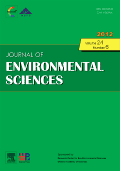
Journal of Environmental Sciences
Advancing Environmental Knowledge for a Sustainable FutureJournal of Environmental Sciences, published by SCIENCE PRESS, is a premier scholarly journal dedicated to advancing knowledge in the multidisciplinary fields of environmental science, environmental chemistry, and environmental engineering. Established in 1970 and based in Beijing, China, this journal has consistently garnered recognition for its high-quality research, demonstrated by its Q1 rankings across multiple categories, including Environmental Chemistry, Environmental Engineering, and General Environmental Science. With an impressive Scopus rank of #11 for Environmental Science, the journal has firmly positioned itself within the top tier of its field, attracting contributions from leading researchers and academics worldwide. Although it operates under subscription access, the journal's commitment to disseminating critical insights into pressing environmental issues makes it an invaluable resource for professionals, researchers, and students striving to make impactful contributions to the understanding and management of environmental challenges.

ENVIRONMENTAL MANAGEMENT
Championing impactful research in ecology and pollution.ENVIRONMENTAL MANAGEMENT, published by Springer, stands at the forefront of advancing sustainability and ecological stewardship in the fields of Ecology, Global and Planetary Change, and Pollution. With an impressive tracking history from 1977 to 2024 and prestigious quartile rankings reflecting its significant impact (Q1 in Ecology and Q2 in both Global and Planetary Change and Pollution), this journal engages a wide range of stakeholders, including researchers, policymakers, and environmental professionals. The journal is a vital resource for those dedicated to addressing pressing global environmental challenges, publishing rigorous interdisciplinary research that informs policy and practice. While it does not offer open access, its content remains accessible through institutional subscriptions. Located in the heart of New York, ENVIRONMENTAL MANAGEMENT is dedicated to fostering a substantive dialogue on innovative approaches to environmental preservation and management.
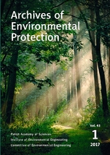
Archives of Environmental Protection
Advancing the Frontiers of Environmental KnowledgeArchives of Environmental Protection, published by the Polish Academy of Sciences, is a pivotal journal in the field of Environmental Science. With an ISSN of 2083-4772 and E-ISSN of 2083-4810, this journal serves as a critical platform for disseminating innovative research and comprehensive reviews that address the complexities surrounding environmental issues. As of 2023, it holds a respectable Q3 ranking in Environmental Science, reflecting its relevance and contribution to the academic community, indicated by a Scopus rank of 124 out of 233 in the General Environmental Science category. Although it operates without Open Access, the journal's consistent publication from 2007 to 2024 emphasizes its commitment to advancing knowledge in diverse areas of environmental protection. Researchers, professionals, and students are encouraged to engage deeply with the wealth of insights offered through the rigorous peer-reviewed articles presented in this journal, which strive to foster sustainable practices and environmental stewardship.

Ecological Indicators
Exploring vital indicators for a healthier planet.Ecological Indicators, published by Elsevier, is a prestigious journal dedicated to advancing the fields of ecology and environmental science. With an impressive impact factor and ranked in the Q1 quartile for both Ecology and Decision Sciences categories, the journal serves as a vital resource for researchers and professionals aiming to apply ecological knowledge to real-world problems. The journal covers a broad scope of topics within ecological indicators, aiming to provide comprehensive insights into biodiversity, ecosystem health, and sustainability metrics. Founded in 2001 and continuing through 2024, Ecological Indicators has established itself as a leader in disseminating significant research and innovative findings. The journal's standing is reflected in its remarkable Scopus ranks, placing it among the top percentile in its respective categories. Authors are encouraged to submit their work to share vital findings with an engaged audience of researchers, professionals, and dedicated students, ensuring the continued relevance and impact of ecological research on global environmental policies and practices.

ENVIRONMENTAL SCIENCE AND POLLUTION RESEARCH
Advancing the Frontiers of Environmental KnowledgeEnvironmental Science and Pollution Research is a premier international journal published by Springer Heidelberg, dedicated to advancing knowledge in the field of environmental science and pollution. With an impressive impact factor reflecting its vital contributions to research, the journal is categorized in the top quartiles (Q1 and Q2) across several domains, including Health, Toxicology and Mutagenesis, and Environmental Chemistry. Established in 1994, it continues to be a critical resource for researchers, professionals, and students focusing on pressing environmental issues. The journal provides an insightful platform for disseminating significant findings related to pollution and its effects on health and the environment, contributing to a better understanding and resolution of these challenges. While it currently does not offer Open Access options, its inclusion in prominent rankings, such as the Scopus rankings, underscores its reputation and influence within the scientific community.
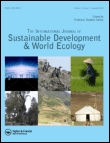
INTERNATIONAL JOURNAL OF SUSTAINABLE DEVELOPMENT AND WORLD ECOLOGY
Transforming sustainability discourse on a global scale.The INTERNATIONAL JOURNAL OF SUSTAINABLE DEVELOPMENT AND WORLD ECOLOGY, published by TAYLOR & FRANCIS INC, stands as a pivotal resource for scholars and practitioners focused on sustainable development and environmental ethics. With an ISSN of 1350-4509 and an E-ISSN of 1745-2627, this journal has made significant strides in the academic landscape since its inception in 1994, aiming to address the complex interrelations between ecological sustainability and development policies on a global scale. Renowned for its rigorous peer-review process, it has achieved a prestigious Q1 classification in both Geography, Planning and Development and Management, Monitoring, Policy and Law, highlighting its influence and relevance among the top tier of scholarly publications. As evidenced by its impressive rankings in Scopus—32nd in Geography and 34th in Environmental Science—this journal plays a critical role in shaping contemporary discourses on sustainable practices. Although it does not currently offer Open Access options, the journal is dedicated to providing a platform for innovative research that not only informs policy-making but also fosters a deeper understanding of global environmental challenges. Whether you are a researcher, policymaker, or student, engaging with the latest findings published in this journal will enhance your insight into sustainable development paradigms.

Journal of Environmental Science and Management
Innovating solutions for sustainable management practices.Journal of Environmental Science and Management, published by the University of the Philippines Los Baños College, serves as a vital platform for disseminating research findings and innovations in the field of environmental science and management. With an ISSN of 0119-1144, this journal aims to foster multidisciplinary discussions and advancements in sustainability practices and environmental policy, primarily focusing on the unique challenges faced in the Philippines and similar ecological contexts. Despite being categorized in the Q4 quartile for Environmental Science (miscellaneous) and holding a SCOPUS rank of #191/233, it provides crucial insights and practical solutions for a diverse audience ranging from researchers to policymakers. While it does not currently operate under an open-access model, its commitment to quality research continues to make it a notable source in the environmental science community. The journal covers a broad timeframe from 2011 to 2024, capturing evolving dynamics in the environmental landscape. Contributing to this journal not only enhances the visibility of local and regional environmental research but also aids in addressing global environmental challenges.
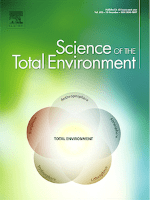
Science of The Total Environment
Leading the Way in Environmental Research ExcellenceScience of The Total Environment, an esteemed journal published by Elsevier, holds a significant position in the field of environmental science, encompassing critical areas such as Environmental Chemistry, Environmental Engineering, Pollution, and Waste Management and Disposal. With an impressive impact factor and ranked in the Q1 quartile across its categories for 2023, the journal is recognized for its high-quality research output and contribution to environmental sustainability. Operating from its base in the Netherlands, the journal has been a valuable resource since its inception in 1972, welcoming innovative studies that address complex environmental challenges. Its notable rankings—such as Rank #9 in both Environmental Sciences and Pollution—underscore its relevance and influence in the academic community. Although the journal currently does not provide an open access option, the robust findings and discussions presented within its pages continue to foster a deeper understanding of environmental issues. Science of The Total Environment is an essential platform for researchers, professionals, and students dedicated to advancing knowledge and solutions in the rapidly evolving field of environmental science.